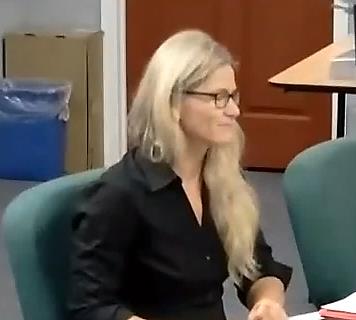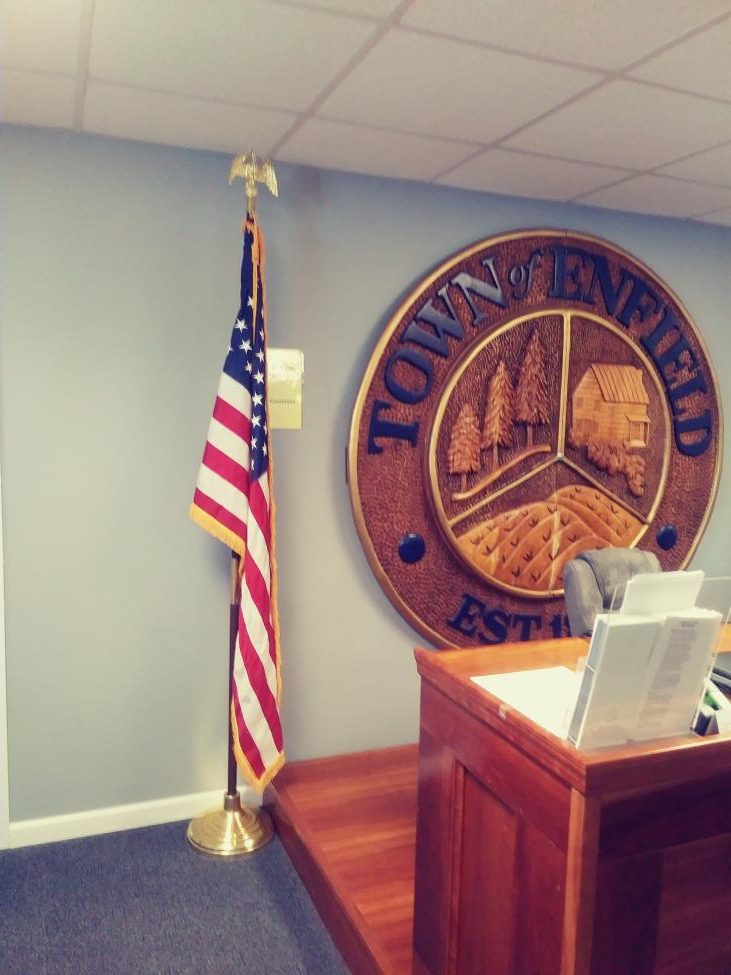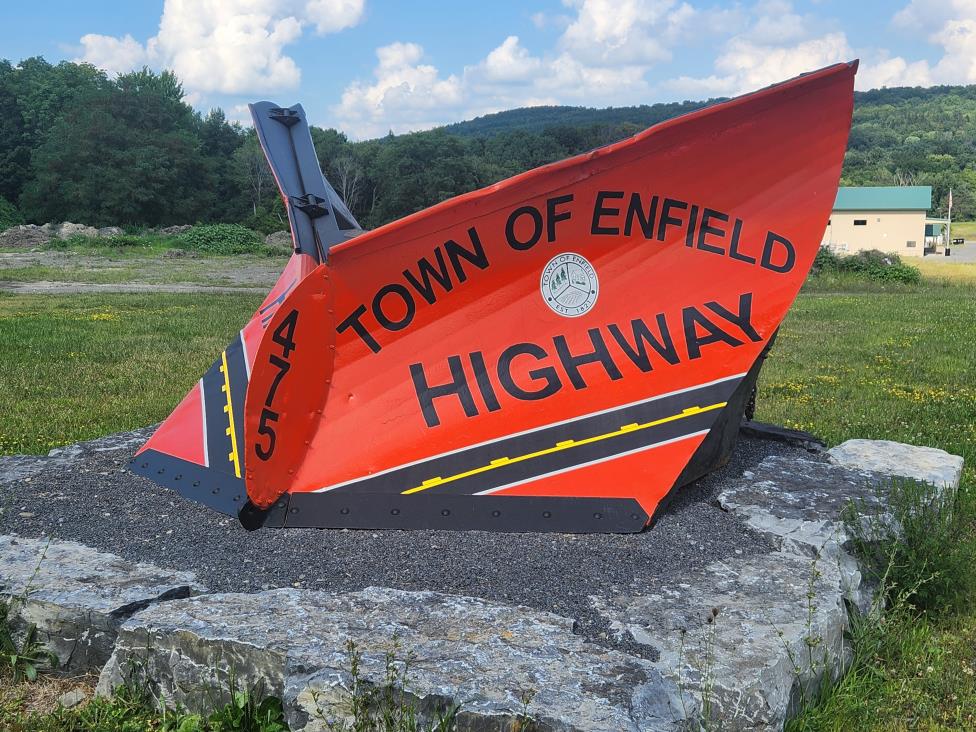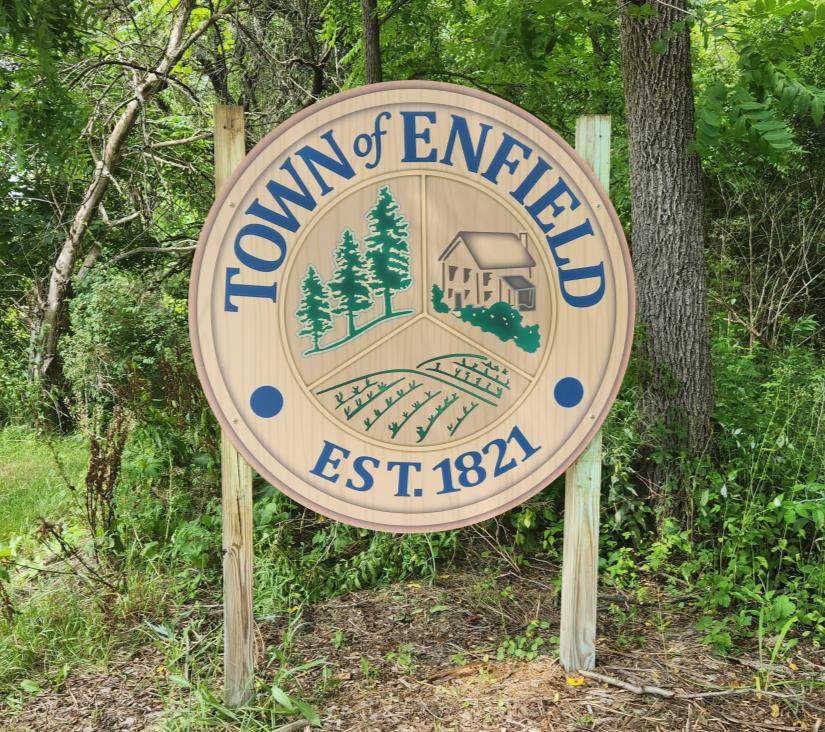Enfield Board readies its ’26 budget for final passage
by Robert Lynch; October 16, 2025
Barring an outpouring of public discontent at a Public Hearing next week, expect the 2026 Enfield Town Budget to be more or less put to bed. And if so, Enfield residents will see about a five percent rise in the town portion of their property tax bills next January, providing their assessments haven’t changed.

By a unanimous vote at its meeting October 8, the Enfield Town Board elevated the Town Supervisor’s slightly-adjusted September spending submission to Preliminary Budget status, a move that locks-in certain expenses, such as elected officers’ pay raises.
Sending the budget on to a hearing October 22, the Town Board that early-October night declined to make any further changes in the spending document, rejecting several amendments that would have done so.
The most notable big-ticket item contained within the $2.67 Million 2026 Budget is a planned $165,000 appropriation to buy of a new mower tractor for the Highway Department. The tractor would replace a 2004 machine currently in use. The acquisition, included as part of a ten-year Capital Plan attached to the budget, has in recent months become a hot-button target of controversy.
As for the overall budget, Enfield Supervisor Stephanie Redmond in September revealed that had all departmental requests won the board’s acceptance, the 2026 property tax levy would have jumped by a whopping 19.68 percent.
But before other Board members had even gotten to see that projection, Redmond had pared figures down to a submitted Tentative Budget that would have hiked the levy by 7.32 percent. Further, relatively minor adjustments made at a Budget Meeting September 17 narrowed the levy increase to 6.53 percent. That’s where the Preliminary Budget now stands.
“Can anyone find a silver bullet that’ll get us down below three percent?” Redmond asked, seemingly in futility, at one point during the October 8 discussion. “Where you going to cut?” she questioned.
Dropping the levy increase by that much, by more than half, would have placed it in compliance with the state-calculated 3.26 percent “tax cap” computed this year for Enfield. The unenforced cap is a penalty- free, but benefit-absent metric that’s largely become an aspirational target for many municipal budget planners.
“You’re not going to stay under the tax cap, not with a budget like this,” Enfield’s Supervisor regretted, “not without cuts to services.”

With most property tax assessments having stayed constant over the past year, the aggregate value of Enfield’s tax base has grown little during that time. Budget documents reflect a meager 1.69 percent growth in tax base since the 2025 budget’s adoption. And that slight aggregate increase largely explains why the tax levy can rise by 6.5 percent while the resulting tax rate (the percentage on which bills are calculated) would increase by only 4.76 percent under the budget currently advanced.
During the October 8th review, only one Board member, this writer/Councilperson, Robert Lynch, proposed any budget revisions. One of the amendments would have elevated the annual salaries for Town Justice Heather Knutsen-King and her clerk each by a meager $530. The amendment was rejected, four votes to one. Only this Councilperson, Lynch, supported it.
Likewise rejected—in these instances without it ever receiving a seconding vote—were Lynch amendments to transfer $125,000 of a Highway Superintendent’s equipment line appropriation to an “Equipment Reserves” account, and the addition of $2,000 in projected Town revenues from proposed planning fees the Town Board may soon impose to process development requests. The planning fees would have more than paid for the Town Court raises.
The highway equipment funding transfer—effectively a wash item not impacting the tax levy— had it been approved, would have accorded the Town Board greater control over the Highway Superintendent’s future equipment purchases, including that for any new tractor.
Town Board members rejected the proposed revenue enhancement from planning fees as too speculative, noting that proposed development in the town has largely dried up over the past year.
“If we get a solar farm, it’ll be a nice chunk of money,” Planning Board Chair Dan Walker interjected during the discussion. But, Walker added, “I’m not seeing potential for a lot of development right now with the economy the way it’s been.”
“It’s not reliable,” Redmond evaluated the never-before-budgeted planning board fees. And with that, the idea of accounting for them got cast aside.
Yet, the judicial salaries received separate discussion.
“I really think that judging from the town-by-town survey that I did of justice salaries, that we are paying too little; it’s almost embarrassingly too little,” this Councilperson, Lynch, advised the Board.

The survey, drawn from among seven municipalities near Enfield and shared with the Town Board in mid-September, revealed that pay rates for justices not shared with an adjacent community ranged from a low of $16,616 (Caroline) to as much as $27,500 (Hector). The most common salaries fell in the $17,000 to $19,000 range. Yet those salaries sometimes occurred in towns with two justices, with each jurist paid the stated amount.
“Well, the other judges have been there a bit longer,” Redmond responded, defending her recommendation to keep the judicial raises to the three percent budgeted for other Enfield elected officers.
Heather Knutsen-King has served as Enfield Town Justice since 2024.
As proposed by Redmond and later incorporated within the preliminary budget, pay for Knutsen-King and her clerk would rise from $16,000 to $16,480. The justice had sought $18,000 for each position.
“I just believe that equity dictates that we raise that salary to $17, 000,” this Councilperson, Lynch, told the Board. “If you don’t want to make the Planning Board fees cover it, that would not change the tax levy that much.”
Elevating the Enfield budget to preliminary status, however, precludes any further increase in Knutsen-King’s pay until 2027.
In her paring down of departmental requests, Supervisor Redmond had zeroed-out the $75,000 Equipment Reserve that Highway Superintendent Barry “Buddy” Rollins has employed during the current year to buy new machinery. That paper loss is misleading, however, since the preliminary budget also vastly inflates the “Equipment” purchase line—by $135,000—mostly to buy the new tractor.

“I really think it’s a big mistake taking out the Equipment Reserve of $75,000,” Rollins complained. A pickup truck that cost $46,000 in 2020, now costs $72,000, the Highway Superintendent said. A 10-wheeler plow truck that cost $250,000, now sells for $385,000. And Rollins further maintained that earlier plans had called for pumping $130,000 new money into the reserves over the last three years. But little more than half that amount was assigned for this current year, and now nothing for the year ahead.
“It is what it is; the cost has gone up on this stuff,” Rollins said as he sought to bargain for the funding increase he never got. Redmond warned adding the $75,000 would jump the tax levy’s increase to 10.3 percent.
Talk turned to the Highway Department’s big-ticket expected purchase, the mower tractor.
“I think we have to rely on Buddy to do the good work that he did earlier this year that unfortunately didn’t pan out,” this Councilperson, Lynch, said, “and that is to look for a good, used, recent-vintage mower tractor that can be afforded, and we can spend a lot less money on it. I encourage Buddy to do that, and I think he has the wherewithal and the acumen and the good common sense to find that unit.”
Last July, Rollins, with Town Board endorsement, attempted to purchase a gently-used 2022 tractor at auction. The machine went for slightly more money than the superintendent chose to pay. Yet, if bought, it would have cost about half of what’s now budgeted for the new tractor.
“And sometimes, as I see it, you have to live with used when you’d like new, but you can’t afford it,” this Councilperson observed.
Rollins noted that he often does buy used equipment, but then it may break and costs money to fix. A second tractor within the Town inventory, a 2021 machine, awaits up to $10,000 in repairs, he said.
This Councilperson countered that even with the inconvenience and repair expense, the Town may still be dollars ahead.
“For a poor town like Enfield, and it is a poor town relative to a lot of others, I think you do a pretty good job of finding these bargains,” Lynch commended Rollins.
What Redmond and the Town Board relied on most to keep Enfield’s tax levy from launching into double-digit heights was again—like last year, though this time even more so—drawing down its accumulated savings, Enfield’s “Fund Balance.” The 2025 Budget had tapped $125,000 from fund balance. The 2026 Budget would raise that annual draw to $182,500.
Town bookkeeper Blixy Taetzsch comforted the Board a bit at the October meeting, predicting a slightly softened fiscal landing. Taetzsch forecast some unspent carry-over funds at the end of this year.
“This is not a guarantee, but it is probably within the realm of what will happen,” Taetzsch said of the brightened fiscal forecast.

Nevertheless, Enfield has a long-standing Fund Balance Policy. It calls for setting aside and never touching $250,000 in each of twin accounts; one for the Highway Department, and another for the General Fund. Thanks to accumulated equipment reserves, Highway’s doing OK. But with the latest draw-down the 2026 Budget proposes, the General Fund balance would leave little more than $27,000 freely available to appropriate. A year ago, the calculated cushion was $129,080, nearly five times the new amount.
There’s “not a lot of wiggle there,” Taetzsch conceded of that General Fund’s cash availability.
“What do we do next year?” this Councilperson, Lynch, quizzed Redmond, noting that what’s been freely drawn upon in the past may not exist in the future.
“We’re going to lose 100,000 out of the budget next year because of the debt service,” Redmond reminded everyone. The Supervisor clings to the expectation that when 20 years of bonding payments end in 2026 on the Town Highway Garage, the budget can redirect the freed-up $102,000 long-held annual burden to pay for something else.
“But you’re not going to lose 182-five,” this writer reminded Redmond of the windfall’s limited reach.
“Well, hopefully, we’ll have some carry-over at the end of this (upcoming year), and we’ll have some savings, or we’re otherwise going to be in another pickle,” Redmond answered, a carefree chuckle to her voice.
Reassuring words, one may guess. Enfield’s budget hearing is Wednesday, October 22.
###

